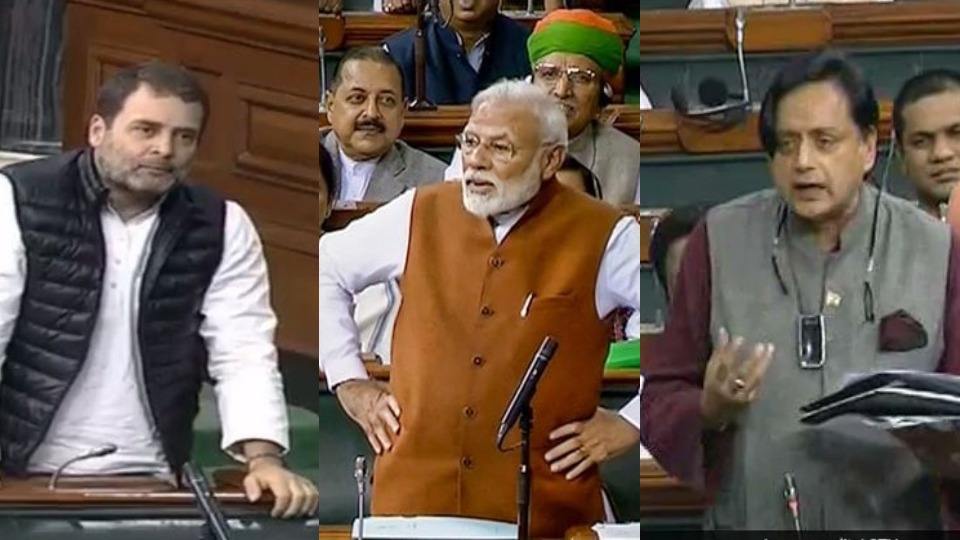
Tube light to Nehru: Modi, Rahul, Tharoor slug it out on poll eve
Heated debates, political barbs, personal digs made up Parliamentary rhetoric as the Delhi election campaigning came to an end on Thursday.

Heated debates, political barbs, personal digs — made up Parliamentary rhetoric during the ongoing Budget session on Thursday (February 6).
With two days left for Delhi polls, party leaders from across the board were acerbic and searing in their criticism of the opponents.
On the day, Prime Minister Narendra Modi, while replying to the debate on the motion of thanks to the President’s address in the Lok Sabha, took on the Citizenship Amendment Act (CAA) critics and spoke about several issues, including farmer welfare schemes, Bodo conflict in the northeast, Ram temple, Article 370 and Triple Talaq, among others.
Modi slammed the Congress for its ‘politics’ in the past seven decades, saying the party’s politics had been such that no Congress leader can be ‘self-sufficient’ and very too dependent on the Gandhi family. Talking about the rising unrest over CAA in the country, he accused the grand old party and Left parties of inciting people at protest sites.
Was Nehru communal?
The prime minister also stuck to his tradition of attacking Nehru. He said India’s first prime minister was in favour of protecting minorities in Pakistan.
“In 1950, the Nehru-Liaquat Agreement was signed for the protection of minorities living in India and Pakistan. Religious minorities were mentioned in this agreement. Nehru was such a big thinker, then why did he not include all the citizens there in the agreement instead of the minorities there?” Modi said.
“I want to ask Congress, was Pandit Nehru communal? Did he want a Hindu Rashtra?” he asked.
Congress leader Rahul Gandhi hit back at Modi accusing him of distracting from the real issues. “PM Modi’s style is to distract the country from the core issues. He talks of Congress, of Jawaharlal Nehru, of Pakistan, etc but not of core issues,” he said.
Modi’s tube light jibe
The prime minister took a dig at Congress leader Rahul Gandhi after he rose to intervene in the speech. Modi said, “I have been speaking for 30-40 minutes but it took this long for the current to reach. Many tube lights are like this,” Modi said prompting some laughs in the house.

Taking another swipe at Gandhi’s earlier comments, he said, “I heard a Congress leader (Rahul Gandhi) say yesterday that youth will hit Modi with sticks in six months. I have decided that I will increase my frequency of ‘Surya Namaskar’ so that my back becomes so strong that it can bear the hit of so many sticks.”
Tharoor VS Modi
Modi who was on an attacking spree did not spare Senior Congress leader Shashi Tharoor. While hitting out at the critics of Jammu and Kashmir special status revocation in Lok Sabha, he said, “Shashi Tharoor ji you have been the son-in-law of Jammu and Kashmir, you should have shown concern.” The prime minister was referring to Sunanda Pushkar, Tharoor’s late wife.
Tharoor, known for comebacks, took to twitter and said, “Don’t know whether to be flattered or amused to hear my name four times in the Prime Minister’s speech. But I was not amused that he continued to tilt at the windmills of history & reduce a solemn Constitutional occasion into an occasion for a petty political speech.”
Don’t know whether to be flattered or amused to hear my name four times in the Prime Minister’s mellifluous speech. But I was not amused that he continued to tilt at the windmills of history &reduce a solemn Constitutional occasion into an occasion for a petty political speech.
— Shashi Tharoor (@ShashiTharoor) February 6, 2020
Modi in Rajya Sabha
The prime minister also launched a strong defence of the National Population Register (NPR), saying it was being updated to allow the rightful beneficiaries get the benefit of government welfare schemes.
“Don’t try to mislead people,” he said, asking opposition parties to not politicise the issue for narrow political gains.
“They are opposing (NPR) for narrow and frivolous political narrative. This is anti-poor,” he said, adding his government had made productive use of the data collected by previous NPR to give benefits of the schemes to the poor.
(With inputs from Agencies)


